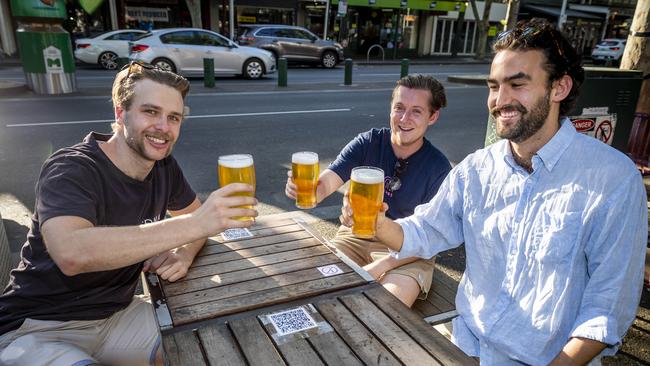United Malt chief executive Mark Palmquist fears collapse in demand
Will the colder months hit outdoor venues and disrupt drinking patterns again?

United Malt chief executive Mark Palmquist fears a second and third wave of COVID-19 crashing through Europe, Britain and the US in winter could trigger a collapse for demand in the key malt ingredients he supplies to the commercial beer and craft beer industries early in 2021.
As winter approaches and COVID-19 cases spike, outdoor dining becomes increasingly problematic, especially in the colder parts of the US, and with pubs and bars restricted to how many patrons can come inside for a beer it could slash beer sales.
The boss of the United Malt, the fourth-largest commercial maltster globally with facilities in North America, Europe and Australia, said the company was yet to witness any drop-off in orders during the current coronavirus spike in the northern hemisphere but with winter approaching the situation could get worse.
While United Malt’s core ingredients operations in the 2020 financial year benefited from a rise in off-premise consumption as consumers chose to purchase beer and other alcoholic beverages to drink at home, this hadn’t mitigated the evaporating drinkers at pubs, clubs and other licenced venues through lockdown restrictions and industry wide shut downs in hospitality.
“North America is a little bigger concern for me because the cases are rolling on and a it is hitting the winter months, so it is a combination of that and hitting regular influenza season and a little bit of a concern of losing outdoor (hospitality) capacity,’’ Mr Palmquist told The Australian as United Malt posted a full-year profit of $45.6m, down 20 per cent.
“That would mean the on-premise consumption. A lot of (venues) operating with reduced capacity, they have expanded their outdoor seating.
“The (warmer) southern half of the US could be able to accommodate that quite well, it is just the northern half of the US that will struggle a little bit.
“We are not seeing any change but there is just a little bit of concern about what the future could be, but so far we are not seeing any drop off. We just don’t know at this point … demand is still going good and haven’t seen any drop in shipments.”
United Malt, which recently split from GrainCorp, recorded revenue of $1.29bn for the 12 months to September 30, down 2 per cent, as underlying net profit after tax of $57.43m, was down 3 per cent on the prior year.
Weaker revenue was driven by COVID-related volume declines in the second half of the year, following a solid performance in the first half. Underlying EBITDA was $156.1m, down 11 per cent on the prior year.
Earnings in the second half were impacted by COVID-related declines in volumes and a change in product mix, together with an increase in corporate costs and insurance premiums as the business transitioned to a stand-alone listed entity on the ASX following its successful demerger from GrainCorp in March.
United Malt declared a final dividend of 3.9c per share. The record date for determining entitlements to the final dividend is December 14 with scheduled payment on December 30. No interim dividend was paid by United Malt with respect to the first half-year ending March 2020 result, as these earnings were attributable to shareholders of GrainCorp.
Mr Palmquist said United Malt had traded through COVID-19 with a strong balance sheet with the company interested in acquisitions.
He said acquisitions could be in related ingredients manufacturing and beverage packaging distribution.
United Malt continued to implement its organic growth strategy in the year, including upgrading and expanding the capacity of its malting facilities.
“The £51m ($93m) investment in the Bairds’ Scottish malting facilities will add 79,000t of capacity across our Arbroath and Inverness sites, bringing our total capacity to around 300,000t per annum.”




To join the conversation, please log in. Don't have an account? Register
Join the conversation, you are commenting as Logout